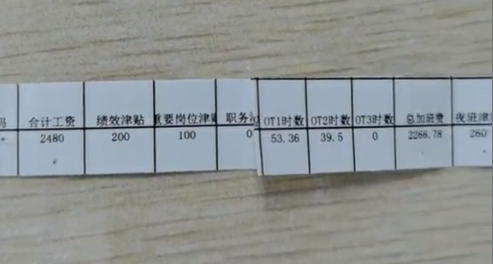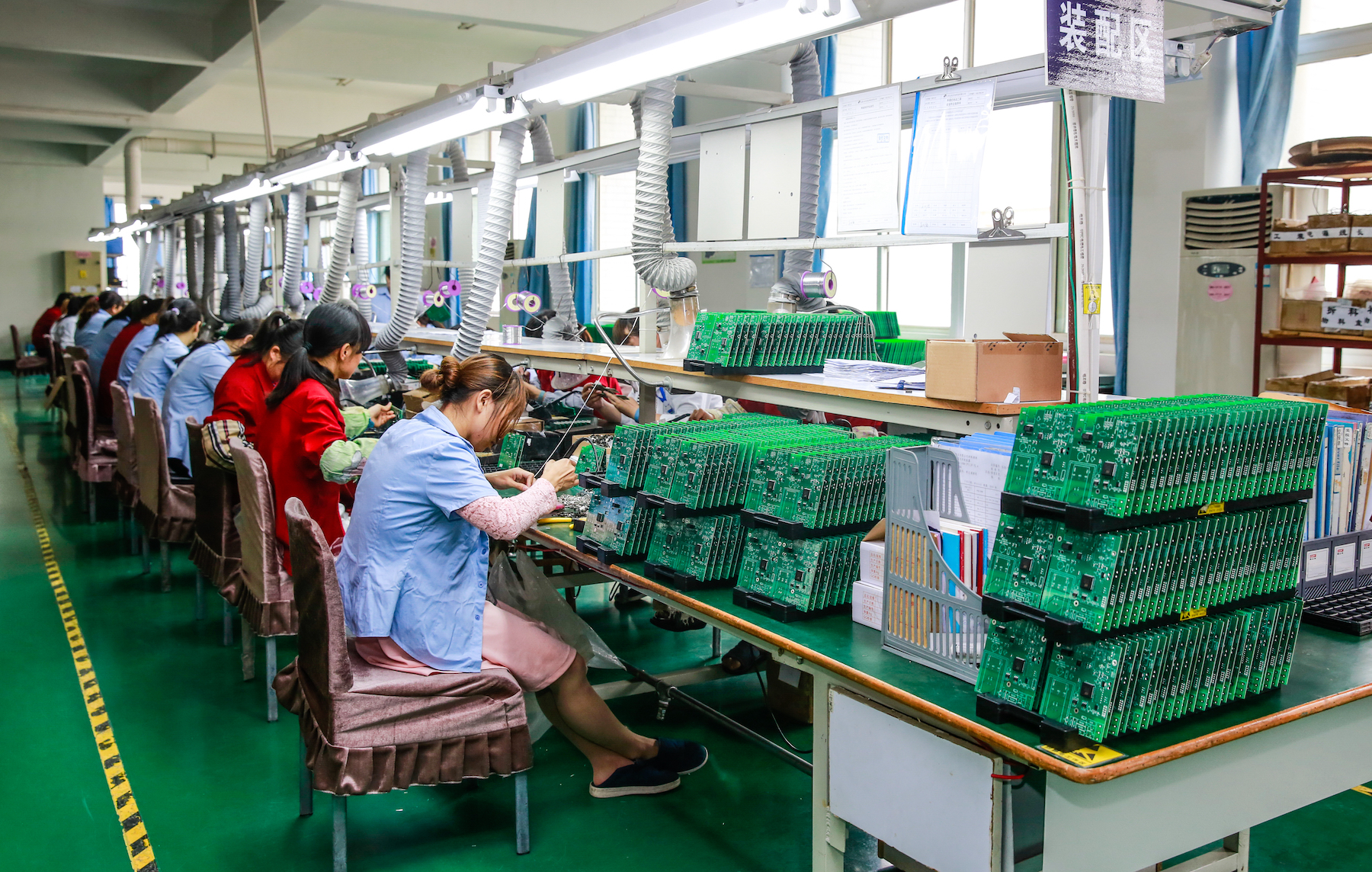- The relocation of Shanghai Amphenol caused grievances among workers since the overtime pay was excluded from average monthly salary in the severance compensation plan, creating a huge gap between the employer’s offer and workers’ expectations.
- For manufacturing workers in China, overtime work is a norm and overtime pay can take a great percentage of their income. The compensation may fail to adequately reflect workers’ income and their contributions if overtime pay is not considered.
- There is room for interpretation of the current compensation calculation method in the Labour Law. Trade unions should take the opportunities to leverage global supply chain act and negotiate with employers for workers’ best interests during factory relocation and closures.
On January 15, 2024, a worker of Shanghai Amphenol Airwave Communication Electronics Co., Ltd. posted a video online, stating that the company is relocating to another province and laying off its workers. The company has offered a compensation plan of "N+1" times average monthly salary, where "N" represents the number of years employed.

Photo: Shanghai Amphenol workers discussing compensation. Source: internet
The worker pointed out that the overtime pay was not included in the calculation of the average monthly salary, resulting in a significant disparity between the company's plan and what the workers believed they were entitled to receive.
Despite workers hoping to engage in further negotiations, the company imposed a strict deadline of only three days for workers to accept the plan. If workers had failed to comply, the contracts would be unilaterally terminated and workers would receive even lower compensation consequently.
The plan had caused great grievances among workers. The worker in the video pointed out that based on the company's calculation, an employee with 14 years of seniority would only receive 70,000 yuan of compensation, with an average monthly salary of approximately 4,667 yuan.
According to previous advertisements for recruitment by Amphenol, workers’ salary ranged from around 4,800 yuan to 6,000 yuan a month. The basic salary was 2,480 yuan, equivalent to the minimum wage in Shanghai at the time, while the overtime pay ranged from 1,920 yuan to 3,120 yuan. In another video posted by worker Li, her salary was around 5,256 yuan in September 2023, of which 2,266 yuan was overtime pay, accounting for 43 percent of her monthly income.

Photo: Worker Li’s payroll in September 2023. Source: Internet
Due to different calculation methods, the compensation offered by the company was about half of what workers proposed.
With over 1,100 employees now, Shanghai Amphenol Airwave Communication Electronics Co., Ltd. was established in 1999. The Company designs, produces, and markets stubby antennas, internal antennas, retractable antennas, and other related products. It is a subsidiary of the U.S. listed company Amphenol Corporation.

Photo: products of Shanghai Amphenol Airwave. Source: company website
According to workers, Shanghai Amphenol started its relocation in 2021. While the research and development centre remains in Shanghai, all the other factories will be moved to Haiyan County in Jiaxing, Zhejiang following this relocation. The company also provided an option for employees to relocate with the company. However, most workers considered it too far and were unwilling to move. They were concerned that the offer was merely a strategy to terminate their employment and that the company would not provide steady employment for them in Haiyan.
The ambiguity of law: should overtime pay be included when calculating compensation?
If overtime becomes the norm, excluding overtime pay from average month salary may result in insufficient economic compensation.
According to article 27 of “Regulations on Implementation of the Labour Contract Law” in 2008, the monthly salary for economic compensation is calculated based on the worker's entitled wages, including hourly wages, piecework wages, as well as bonuses, allowances, and subsidies.

Photo: humphery/ Shutterstock.com
When the worker called the Ministry of Human Resources and Social Security for consultation, the staff informed them that according to the Labour Law, overtime pay was not considered part of the average monthly salary until September 2023. However, starting from September 2023, overtime pay should be included in the calculation.
According to a judicial interpretation made by Shanghai High People's Court in the "Q&A on the Application of Civil Law" in 2013, "overtime pay should not be included when calculating economic compensation." Shanghai High People's Court states that overtime pay is the remuneration for the additional labour provided by the workers and does not fall under the category of labour remuneration during normal working hours.
However, Shanghai High People's Court also states that if there is evidence that the employer intentionally takes a portion of what should be included in normal working hour wages as overtime pay to reduce compensation, then "overtime pay" should be included in the calculation for economic compensation.
The union failed to help workers fight for best interests despite participation
On the second day of negotiations with the company, the union's lawyer arrived on the scene and stated that "Shanghai does not include overtime pay in the calculation of compensation". The statement made the workers lose confidence in continuing to fight for more compensation, and most of Amphenol's employees chose to accept the company's proposal eventually.
CLB called the Union Policy Hotline for Shanghai Workers to inquire about the incident.
Instead of answering the questions on the calculation of compensation, the staff said they could transfer the call to the union's lawyer. When asked about the union's view on the calculation of compensation, the staff replied, "there is no document about this issue", and "it needs to be confirmed with the Labour Bureau". After conducting research, the staff found that the Labour Bureau specified that overtime pay should not be included in the calculation of compensation, and continued to suggest that if there are any doubts, one should report the issue to the Labour Bureau for clarification.
Shanghai Amphenol relocation dispute seems to have ended peacefully, but there is still room for improvement for both the union and the company.
The union, which is obligated to represent the workers, should have intervened more actively and put the labour issues caused by the relocation on the bargaining table. If the Shanghai Federation of Trade Unions could raise questions to the Labour Bureau on behalf of the workers or provide explanations regarding compensation calculations, workers' concerns would be better addressed.
The trade union staff recorded the above suggestions raised by CLB and stated that they would pass the message forward.
As a large international company, Amphenol has subsidiaries operating in various provinces in China. Continuing factory relocation has the potential to trigger a larger scale of workers’ collective actions if the labour issues have not been properly addressed.
As a member of the Responsible Business Alliance (RBA), Amphenol is required to comply with local laws and respect workers’ freedom of association. Additionally, Amphenol supplies to multinational companies including NOKIA, Apple, SIEMENS, etc. These brands also have commitments in corporate social responsibility and supply chains.
With Germany implementing the Supply Chain Act and other supply chain legislation in Europe, both Amphenol and multinational brands have the capability and responsibility to address labour disputes in the Global South manufacturing factories.
